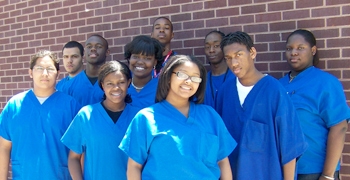 |
Center for Reducing Health Disparities’ summer interns 2008 outside Baker’s Place clinic. |
Over an eight-week session, the students learned about bones, muscles, heart disease, STD’s, HIV/AIDS, dentistry and basic medical terminology.
The new program attracts promising students from underrepresented minority populations and gives them an opportunity to learn more about health science careers and the importance of research.
“The summer program introduces these young men and women to the fundamentals of scientific research and its central role in developing solutions to diseases that resist treatment and cure,” said Tom Rosenquist, Ph.D., UNMC vice chancellor for research. “Our outstanding corps of UNMC researchers is there to prove to the next generation of scientists that clinical trials are essential to the advancement of health science, and that participation in clinical trials is an asset to the community.”
Funding for the program is provided by UNMC’s vice chancellor for research office. It is sponsored by UNMC’s Center for Reducing Health Disparities in the College of Public Health.
|
Intern Che Olson, 19, said the program broadened his horizons.
“The experience has shown me how big of an impact that just one small group can have on an entire community,” Olson said.
During his internship, 17-year-old Steven Buffalohead donned scrubs to observe a kidney transplant.
“The shadowing experiences were awesome,” Buffalohead said. “It was amazing to see a damaged kidney replaced with one from the patients’ mother. I’ll never forget that experience.”
Teaching members of a youth group called “The Sun Dawgs” about the bones in the body, CPR/First Aid, staying fit and eating healthy, was the highlight of the summer for 17 year-old intern Kaneesha Reed.
“Each week, we were able to teach them healthy things,” Reed said.
Alecia Hill — a 17 year-old intern — found a research project that had interns trying to purchase a healthy meal at a dollar store particularly interesting.
“We had to check the calcium, protein, sugar content and more,” Hill said. “We were divided into teams and had to race to see who could get there, identify and purchase the healthiest food to make a meal.”
The internship program also allowed the participants to confront pressing community health issues by assisting with health screenings in north Omaha, 16 year-old Shomari Huggin said.
“Community health in the northeastern parts of Omaha is often poor,” Huggin said. “A large part of the problem is the lack of health awareness. Getting us involved with the community health screening helped us address this issue.”